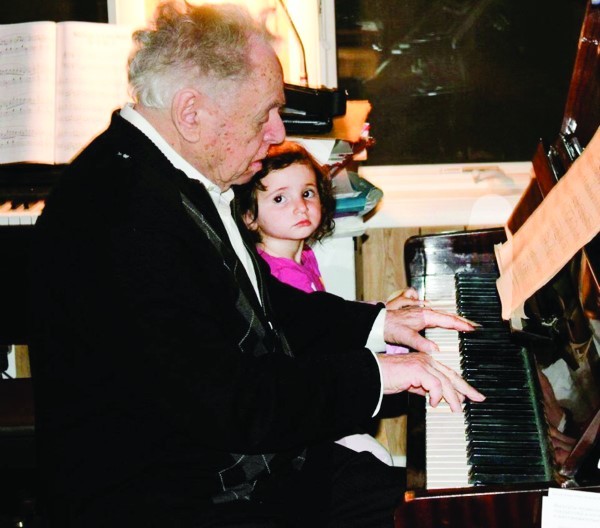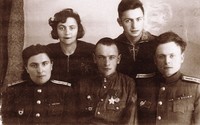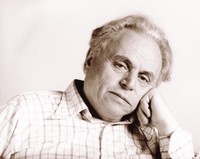RIC to perform Russian-American composer’s ‘Holocaust’
On the evenings of Dec. 6 and 9, you can be part of a Jewish World War II veteran’s dream.
On those dates, Dr. Simon Skurkovich’s “Holocaust,” a symphonic poem for orchestra, chorus and soloists, will be performed by the Rhode Island College Symphony Orchestra and the Rhode Island College Chorus as part of its Winter Concert.
Dr. Skurkovich, M.D., Ph.D, D.Sc, is a world-renowned scientist, medical researcher, professor and inventor whose pioneering work in immunology, infectious diseases, rheumatology and oncology has saved hundreds of thousands of lives and led to the development of novel approaches in the treatment of autoimmune diseases. In addition, he is a composer.
Rhode Islanders may recognize the surname because Skurkovich’s son, Boris, is a well-known local pediatrician and infectious disease specialist. Simon Skurkovich is also the man I feel honored to call my father-in-law.
Skurkovich, 94, originally from Moscow, immigrated to Maryland, where he still lives. Although his wife died in 1996, he continues to live in his own home. He wakes early, eats his home-cured raw salmon –which he insists is a necessity for long life – and sets to work, spending his days thinking, writing scientific papers, applying for patents and, for the last few years, fulfilling his dream of completing his requiem to the Holocaust.
Skurkovich’s love of music started in his early childhood. His parents were poor and he was one of six children. At the age of 6 he and his brother were sent to an orphanage to live for a few years because there just was not enough food at home. During this time, he taught himself to play the piano. Leading musicians called him a wunderkind when they heard him play.
Once he returned home to live, Skurkovich no longer had access to a piano. At the age of 8, he wrote a letter to Stalin about his plight. Stalin was so impressed by this child that the government got a rental piano for his home.
Later, when Skurkovich met with Sergey Prokofiev, one of the musical geniuses of the 20th century (his ballet “Romeo and Juliet” and other works are performed worldwide), he was told that he should devote himself to composing music full time. But Skurkovich wanted to help people by becoming a physician.
At the age of 22, having just completed medical school, Skurkovich became a captain in a tank regiment of the Soviet army. While serving as a physician at the Russian front, he witnessed death and destruction, was wounded twice and was once left for dead.
His unit participated in many major battles during the liberation of Eastern and Central European countries from the Nazis.
In Austria, together with his unit, Skurkovich helped free prisoners of a concentration camp, where he witnessed the true horrors of the Holocaust. These scenes and the victims that he saw there left him with deep emotional scars that never healed.
Over the past 20 years, Skurkovich has worked on his requiem “Holocaust.” This “symphonic poem” is Skurkovich’s way to help us to never forget this atrocity, and to honor the memory of those who perished and those who fought to survive.
“Holocaust” is not Skurkovich’s first large orchestral work. In 1977, his piano concerto, which contained a number of well-known Jewish melodies, was performed in Moscow to enthusiastic public and critical acclaim. This was a time of Jewish revival in the Soviet Union, when tens of thousands of Jews were fighting for their right to emigrate to Israel.
Many were denied this right and became “refuzeniks.” They lost their jobs, were harassed by authorities, and even jailed. Skurkovich’s Concerto for Piano provided great inspiration and moral support to the Jewish community in Moscow.
Skurkovich believes “music and science are part of the same intellect” and his contribution to medical science is enormous. Until 1978, Dr. Skurkovich was the chief of a large scientific laboratory in a leading research institute in Moscow, but in 1979, he was invited by The National Institutes of Health to come to the United States to continue his research.
Over his lifetime, he has been awarded more than 30 U.S. and foreign patents and authored more than 300 scientific publications and two books. He has received multiple awards and honorary degrees, including a commendation from President Obama. Last year, on the 75th anniversary of the end of WWII, our family was able to see the inside of the Russian Embassy in Washington, D.C., as we watched Skurkovich receive one of the highest awards in the Soviet Union, The Order of Friendship, for his contributions to science and the people of the world.
We are extremely grateful to our friends and family in Rhode Island and around the country who helped fund our Kickstarter campaign to pay the thousands of dollars it cost to have a score written for each orchestra instrument, and to conductor Alexey Shabalin and Rhode Island College for performing “Holocaust.”
“Holocaust” will be performed Dec. 6 and 9, at 7:30 p.m., in Roberts Hall at Rhode Island College, in Providence, as part of the Winter Concert. Tickets are $10 at the door, $5 for seniors and non-RIC students, and free for RIC students and faculty.
For more information, go to https://www.ric.edu/mtd/calendar_musicEvents.php.













